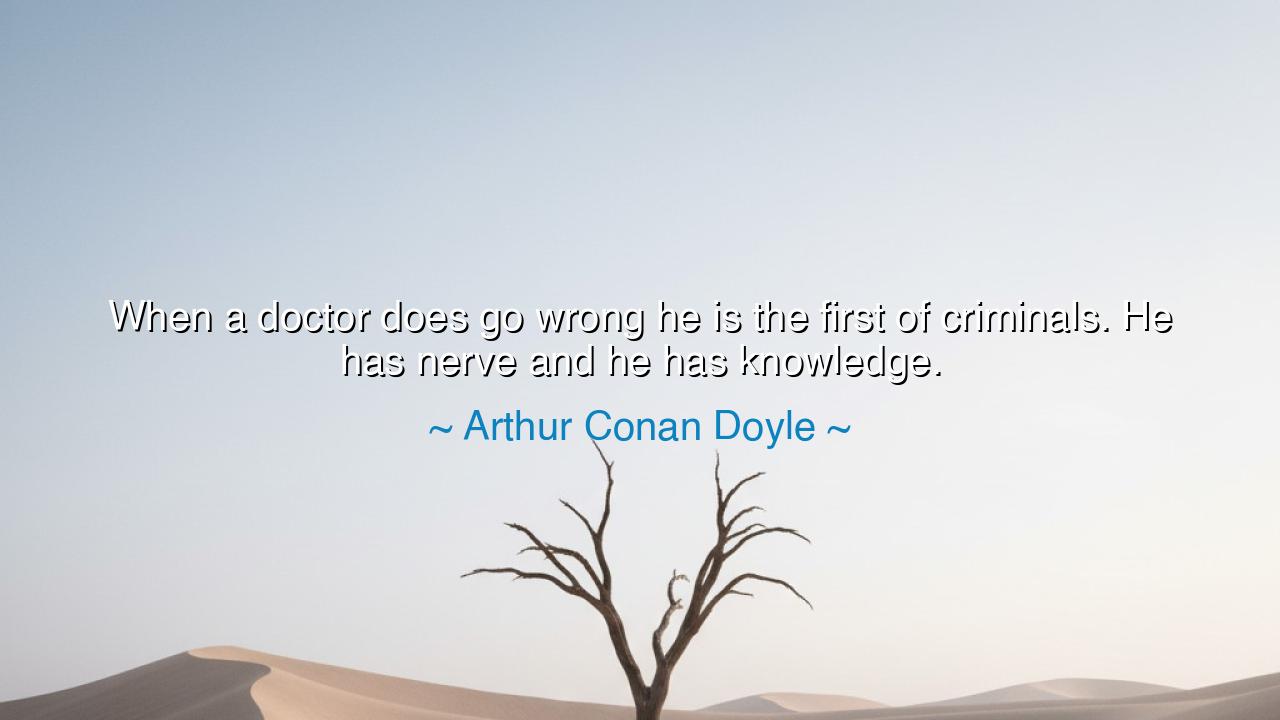
When a doctor does go wrong he is the first of criminals. He has
When a doctor does go wrong he is the first of criminals. He has nerve and he has knowledge.






"When a doctor does go wrong he is the first of criminals. He has nerve and he has knowledge." Thus warned Arthur Conan Doyle, himself trained in medicine before he gave life to Sherlock Holmes. His words echo like a somber bell, reminding us of the peril that arises when the healer, the one entrusted with life itself, strays from the path of honor. For the doctor is armed with more than skill—he holds in his hands the secrets of the body, the mysteries of disease, and the trust of the vulnerable. Should he betray that trust, his crime is greater than any thief or murderer, for he has twisted the very gifts meant for salvation into weapons of destruction.
The meaning of this truth is layered and grave. The doctor is granted sacred power: the power to preserve, to heal, to sustain. But with this power comes the temptation of pride, greed, or cruelty. Conan Doyle tells us that when such a one does "go wrong," he is not merely a sinner among many, but "the first of criminals," for he has both nerve—the courage to act boldly—and knowledge—the wisdom to carry out deeds beyond the reach of ordinary men. In his corruption, he is doubly dangerous, because he uses the light of learning as a cloak for darkness.
History bears terrible witness. Consider the crimes of Josef Mengele, the physician of Auschwitz. He was trained in medicine, sworn to heal, yet he descended into monstrosity, using his skill and authority to inflict unimaginable horrors upon the innocent. His knowledge gave him means, his nerve gave him boldness, and his betrayal of trust made his crimes more grievous than those of common soldiers. This is the nightmare Conan Doyle foresaw: when healers become destroyers, they corrupt both science and humanity.
Yet the words also serve as warning, not only against infamous villains but against the subtle corruption that may touch any man of knowledge. A doctor who prescribes for profit, who withholds care from the poor, or who neglects duty out of arrogance—such a one may not make history’s black lists, but still carries the weight of betrayal. For the physician’s art is meant to serve life; whenever it is bent toward selfish ends, the healer becomes, in measure, a criminal of conscience.
But let us not despair, for the same truth also reveals the greatness of those who remain faithful. The doctor who resists corruption, who uses his knowledge not for harm but for healing, is among the noblest of men. Think of Albert Schweitzer, who left comfort and fame to serve as a physician in Africa, tending the sick with humility. His knowledge and nerve were wielded not for crime but for compassion, showing that the same gifts which make a corrupt doctor dangerous can make a faithful doctor saintly.
The lesson is clear: all who possess knowledge bear a sacred burden. To know more than others is not license for pride, but a call to deeper responsibility. When married to virtue, knowledge becomes light; when divorced from it, knowledge becomes a weapon. The greater the power, the greater the peril, and the more severe the fall when corruption takes hold. Thus, each of us—whether doctor, teacher, leader, or artisan—must guard our gifts with humility and integrity.
Practical action follows. If you are one who holds knowledge, seek always to align it with conscience. Examine your motives, lest pride or greed twist your learning into harm. If you are a patient or a follower, do not give blind trust, but hold your leaders accountable, remembering that even the wise may stray. And above all, let education not only instruct the mind but shape the character, so that skill and virtue may walk hand in hand.
So I say to you, children of tomorrow: heed the warning of Arthur Conan Doyle. The healer who betrays becomes the most dangerous of criminals, for he joins cunning to courage, and knowledge to nerve. But the healer who remains faithful is the greatest of servants, bringing light to the suffering and hope to the dying. Guard your gifts, use them for good, and let your knowledge be a lamp, not a blade—for in the end, the true measure of wisdom is not what power it grants, but what love it preserves.






AAdministratorAdministrator
Welcome, honored guests. Please leave a comment, we will respond soon